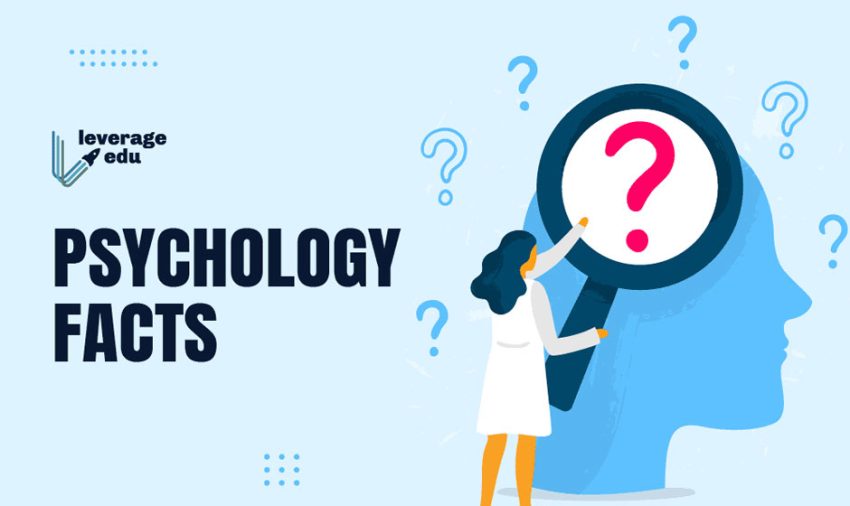15 Fascinating Psychological Facts That Might Explain Human Behavior

Psychology is an ever-evolving science that tries to explain human behavior. The more we learn, the more we realize how much we have yet to understand. There are many psychological phenomena that affect how we think, feel, and behave, and learning about them can give us a better insight into human nature. Here are 15 fascinating psychological facts that can help us better understand ourselves and those around us.
1. Having a Backup Plan May Decrease Your Chances of Success
It’s common wisdom to have a backup plan in case something goes wrong, but did you know that it may actually decrease your chances of success? According to research, people who have a backup plan tend to be less motivated and put in less effort because they know they have other options. Having a backup plan can make you feel like you have a safety net, which can reduce your sense of urgency and drive. So, if you want to succeed, focus on your main plan and give it your all without a safety net.
2. Yawning Can Be Contagious and Demonstrates Empathy
We’ve all experienced contagious yawning, where seeing someone else yawn makes us yawn too. Recent research suggests that this phenomenon is linked to empathy, as people who are less empathetic are less likely to mimic yawns. Children and individuals on the autism spectrum are also less likely to respond to contagious yawning, which could suggest a link between yawn contagion and social cognition.
3. We Care More About Individuals Than About Mass Tragedies
As humans, we tend to care more about a single person’s suffering than we do about mass tragedies like natural disasters or wars. This phenomenon is called the “Identifiable Victim Effect,” which means that we are more likely to donate to charities if we can identify who we are helping. When problems are too big, we tend to feel helpless and insignificant, which can lead to inaction. So, if you want to make a difference, focus on helping individuals and putting a face to the suffering.
4. Beginnings and Ends Are Easier to Remember Than Middles
The “serial-position effect” suggests that we tend to remember the beginning and end of a series better than the middle. This effect can be observed in many areas of life, from remembering a shopping list to recalling the plot of a book. Our brains are wired to prioritize the first and last items, often at the expense of the middle ones. So, if you want to make an impression, try to start and end strong, leaving a lasting memory in people’s minds.
5. It Takes Five Positive Experiences to Outweigh a Single Negative One
Our brains have a “negativity bias,” which means that we tend to give more weight to negative experiences than to positive ones. Research suggests that we need five positive experiences to balance out the effects of a single negative one. This bias can affect our perception of the world, making it harder to focus on the good things in life. So, if you want to be happier, try to focus on the positive experiences you have and savor them.
6. Food Tastes Better When Someone Else Makes It
Have you ever noticed that food tastes better when someone else makes it? It turns out that the excitement and anticipation we feel while preparing a meal can actually reduce our enjoyment of it. This is called the “mere-exposure effect,” where familiarity can breed contempt. So, if you want to enjoy your meals more, try to mix things up and let someone else do the cooking from time to time.
7. We Prefer Knowing What’s Coming
As humans, we are wired to predict and expect the future. When we don’t know what’s coming, our brains go into overdrive trying to anticipate any possible outcomes, which can lead to anxiety and stress. That’s why we tend to prefer knowing what’s coming, even if it’s something unpleasant. This knowledge gives us a sense of control and allows us to prepare for what’s to come.
8. Reactance Can Make Us Break Rules
Reactance is a psychological phenomenon where people tend to rebel against rules and restrictions, especially when they feel like their freedom is being threatened. This effect can be observed in many areas of life, from teenagers rebelling against their parents to people breaking pandemic-related restrictions. When we feel like our autonomy is being limited, we tend to push back to regain our sense of control.
9. Cute Aggression Is a Natural Reaction
Cute aggression is the feeling we get when we’re overwhelmed with positive emotions like love and cuteness. It’s the urge we feel to pinch a baby’s cheeks or squeeze a puppy tightly. Research suggests that this phenomenon is a natural reaction that helps us regulate our emotions and release tension. So, if you find yourself feeling cute aggression, don’t worry, it’s perfectly normal.
10. Confirmation Bias Affects Our Perception of Reality
Confirmation bias is the tendency to interpret facts in a way that confirms what we already believe and reject contradictory information. This bias can affect our perception of reality, making it harder to change our minds or consider other points of view. To overcome confirmation bias, we need to be aware of it and actively seek out alternative perspectives.
11. Our High School Music Stays With Us
Music has a powerful effect on the brain, triggering the release of dopamine and other feel-good chemicals. Research suggests that we are programmed to love the music we listened to in high school because of the emotional resonance it has with that period of our lives. So, if you want to revisit your youth, put on some tunes from your teenage years and enjoy the nostalgia.
12. Memories Are Pieced Together Pictures
As much as we’d like to believe that our memories are accurate snapshots of the past, the truth is that they are more like pieced-together pictures. Our brain stores bits of information and then constructs a narrative around them, filling in the gaps with assumptions and guesses. This process can lead to false memories, where we remember events that never happened or distort the ones that did. That’s why it’s important to approach our memories with a critical eye and check them against other sources.
13. Pareidolia Can Make Us See Things That Aren’t There
Pareidolia is the tendency to perceive specific, often meaningful images, such as faces, in random or ambiguous visual patterns. This phenomenon is linked to our ability to recognize faces, which is so important as social beings. Pareidolia can make us see shapes in clouds, faces in toast, or patterns in the stars. Although this tendency can be amusing, it’s important to be aware that it’s a product of our brain’s pattern recognition system and not an actual phenomenon.
14. The Pygmalion Effect Can Improve Performance
The Pygmalion Effect is a psychological phenomenon where high expectations lead to improved performance. When people believe that they can succeed, they tend to work harder and be more motivated to meet those expectations. This effect can also be observed in the classroom, where teachers’ expectations can significantly affect students’ performance. So, if you want to improve your own performance or that of others, focus on setting high expectations and creating a supportive environment.
15. Short-Term Deadlines Are Easier to Process
As much as we’d like to think we’re great at balancing long-term goals and short-term tasks, the truth is that the brain prioritizes urgent, unimportant tasks and processes short-term deadlines better than long-term ones. That’s why we tend to put off long-term projects in favor of short-term ones, even if they are less important. To overcome this tendency, we need to break down long-term goals into smaller, more manageable tasks and set deadlines for each one.
These psychological facts offer us a glimpse into the complex workings of the human mind. By understanding these phenomena, we can gain a better insight into ourselves and those around us. So, next time you find yourself yawning when someone else does or feeling cute aggression towards a kitten, remember that there’s a fascinating psychological explanation behind it.


